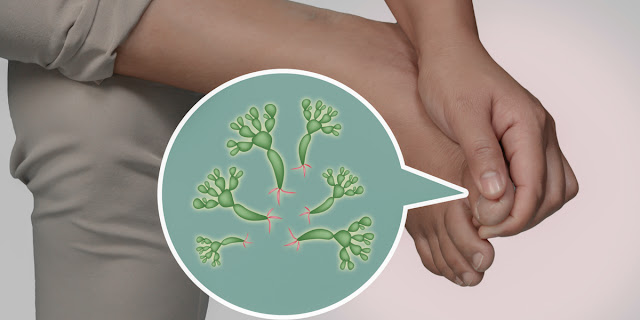
How Do You Get Rid of Fungal Infections?
A fungal infection, called mycosis, is a fungus-caused skin
ailment.
There are millions of distinct species of fungi. They're
everywhere: in the soil, on plants, on household surfaces, and even on your
skin.
Fungal infections can sometimes cause skin issues such as rashes
or pimples.
How Do You Get Fungal Infections?
What causes fungal infection? Here are the main ones.
Humidity and Damp Environment
Sweating profusely or working in a warm, humid atmosphere might raise your chances of contracting a fungal infection.
After all, fungi require a warm, damp environment to thrive.
Walking barefoot in moist environments, such as gyms, locker rooms, and showers might further raise your risk.
These public locations are frequently teeming with fungus
spores.
Skin Injury
Fungi can easily infiltrate under your skin and impact deeper tissues through even minor nail or skin injuries or infections.
That is why wounds should be washed and covered with a sterile
covering or bandage to prevent further infection.
Weak Immune System
If your immune system isn't functioning correctly, you may be vulnerable to fungal infections.
A variety of factors might weaken your immune system.
Nutrient shortages, immunodeficiency diseases, smoking, and even stress, for example, can all decrease immune function.
A weakened immune system also impairs your immunological
response and reduces your body's capacity to fight illness.
Risk of developing a fungal infection
One of the most common risks associated with fungal infection is it can lead to skin diseases.
If a fungal infection is left untreated, it can affect your health. In certain situations, a fungal skin infection might result in permanent damage, and in others, it can result in death.
The fungal infection is a type of disease that is especially troublesome since it affects people already unwell, adding to their pain.
Furthermore, this illness frequently remains undiagnosed and
untreated, aggravating results.
Home remedies for fungal infections
Now that we've discussed the causes and risks of fungal infection, this article will teach you how to treat and prevent fungal infection.
One of the most common home remedies for fungal infections is an antifungal cream. It is especially helpful in fighting mild fungi.
Additional, antifungal cream also serves as a preventive measure. It helps prevent a fungal infection from fully developing into severe skin disease.
Take fungal infection cream for feet as an example. It helps to
treat wounds from turning into athlete's foot.
Reminder
Do not leave the fungal infection untreated.
If creams cannot treat your fungal infection, consult your doctor immediately to prevent it from worsening.
Comments
Post a Comment